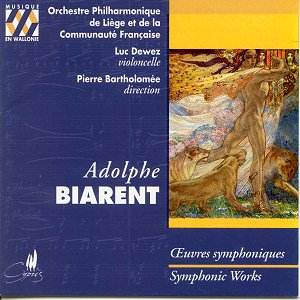ADOLPHE BIARENT (1871-1916)
Trenmor - symphonic poem (1905) 15.54
Symphony (1908) 28.03
Two Sonnets for cello and orchestra (1909-13)
14.41
 Luc Dewez (cello) Orchestre
Philharmonique de Liège et de la Communauté Française/Pierre
Bartholomée
Luc Dewez (cello) Orchestre
Philharmonique de Liège et de la Communauté Française/Pierre
Bartholomée
 rec Conservatoire Royal de
Liège, 16-19 October 1995 CYPRES CYP3601
[58.53]
rec Conservatoire Royal de
Liège, 16-19 October 1995 CYPRES CYP3601
[58.53]
Purchase from:
Amazon
UK

The Belgian composer, Biarent was much taken with the Russian orientalists
- particularly Rimsky-Korsakov.
His Trenmor (based on an Ossianic legend) is suggestive of the alleys
of some Hyperborean city as created by fantasy novelist Robert E Howard.
The music has so many cross-references: Tchaikovskian, Dvorak's New
World, an Italianate Verdian trenchancy, Dukas's L'Apprenti Sorcier,
Bruckner, Rimsky, Glazunov and Wagner. It is richly enjoyable - in about
the same league as Tchaikovsky's Voyevode, Liszt's Hunnenschlacht
or Balakirev's Tamara.
We then turn to the four movement Symphony. This has a Wagnerian generosity
of invention and a sprawling finale (the longest of the four movements at
13:12). This movement is touched with a buzzing rancorous angst and provides
glimpses of Night on the Bare Mountain and the Valkyries in full flight.
Biarent's favourite Rimskian leanings appear at 6.20 (track 5) in a luscious
romance for solo violin. Balletic delicacy carried forward into other Belgian
works such as Meulemanns' Third Symphony. The first movement of the Symphony
has a similar set to the jaw - a storm beclouded urgency buffets the listener.
The whole work is lavish in a cornucopia of romantic detail. That detail
is never excessive whether vertically or horizontally. While you can pick
out the voices of Tchaikovsky (I thought of Hamlet several times while
listening to this disc), Rimsky, Bruckner (listen to parts of the scherzo)
and Wagner there is nothing prolix about the adagio and the vivace - respectively
4:37 and 3:13. In the hands of other composers of Biarent's romantic persuasion
such musical material would have been spun out to at least ten minutes in
each case. It is in Biarent's self-control and succinctness that one senses
his approach to character. Biarent's influences are momentary references
rather than the fabric for complete musical sentences or paragraphs. Think
of Franck's full-length Psyche or D'Indy's Jour d' Eté dans
les Montagnes or Bantock's Hebridean Symphony as the brethren
of this work. The music has that same luxuriantly bejewelled and discursive
effect.
Speaking of Bantock, the Two Sonnets (based on poems printed in the
booklet, by Jose-Maria de Herédia) for cello and orchestra reminded
me of the Bantock Sapphic Poem and Elegiac Poem for the same
forces. Both are strongly evocative of those monochrome drawings by artist
Virgil Finlay, of Delius's music for the souls of the unborn children in
Hassan, and, in their serenity, the short cello pieces by Gabriel
Fauré. They lean towards poetry rather than action although the second,
Floridum mare has a fey virtuosic cello part played ppp - very
much a wraith-like perpetuum mobile.
I have lived with these two discs for more than four months now and can recommend
them very strongly. (
Reviewer
Rob Barnett

